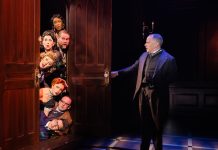Guiseppe Verdi’s Falstaff (libretto by Arrigo Boito) adapts and tightens the plot of Shakespeare’s The Merry Wives of Windsor, creating a varied musical exploration of not only Shakespeare’s characters and situations but the human comedy more generally.
In the Maryland Lyric Opera production given twice last weekend, the cast, composed of singers with vibrant careers primarily in regional opera, did full justice to Verdi’s writing and to the generous emotional vision of the piece.

In the title role, baritone Mark Delavan emphasized Sir John’s complete, uncritical, quite cheerful engagement with his own erotic and culinary appetites. His Falstaff is a fool, to be sure, but in Delavan’s reading the character fortunately lacks the grossness of some interpretations. Light on his feet, this Falstaff overflows with delight when he believes things are going his way, Delavan sometimes moving in a way reminiscent of a good Tevye doing “If I Were a Rich Man.” Bombastic when it needs to be, Delavan’s singing in the role retains a light touch fitting for a character who, his outsize ego notwithstanding, is rather fun to be around.
Falstaff is very much an ensemble show, and the other principals in the cast play their roles flawlessly. A fool of a different type, the hyper-jealous Ford (baritone Brian Major) is a fine foil to Falstaff, their scenes together crackling with male rivalry. Major is especially strong in the higher ranges of Verdi’s writing for the character. His barely controlled fury when, as “Fountain” (the libretto’s name for Ford’s alter ego, Master Brook in the Shakespeare), he has to listen to Falstaff’s insults about Ford, is an excellent comic moment. The third male fool, Dr. Caius (tenor Mauricio Miranda), believes, with scant evidence, that he is a fine match for Nannetta (soprano Rachel Blaustein), Ford’s blooming young daughter.
The men being fools, the women are left in control of the story’s events. The “merry wives” themselves, Alice Ford (Teresa Perrotta, subbing in Sunday’s performance for an indisposed Mary Feminear) and Meg Page (Allegra De Vita), know the score from the outset, when they receive identical, flowery “love” letters from Falstaff. Along with them, Mistress Quickly (mezzo Catherine Martin) and Nannetta conspire to plan Falstaff’s comeuppance. Their quartet, juxtaposed with a male quartet centered on Ford, as both plot their revenge on Falstaff, is one of the vocal highlights of the first act.
Perrotta’s Ford is the ringleader of the female cabal, and her decisive singing and acting drive the plot forward. Martin displays probably the most subtle and effective physical acting of any member of the cast while impressing with her vocal power and richness. In her second act “Fairy Queen” aria, Nannetta provides a moment of exquisite lyricism.
In a role that calls only for lyrical romantic sweetness, tenor Yi Li sings as sweetly as one could ask as Nannetta’s lover, Fenton. As Falstaff’s two clownish, and not very faithful, servants, Bardolfo and Pistola, tenor Joseph Michael Brent and bass Andrea Silvestrelli provide the requisite low comedy. Silvestrelli made a memorable vocal impression in his relatively small role.

Joseph Colaneri conducted the large orchestra with power, subtlety, and a fine touch for the nuances of Verdi’s score. The acoustics of the Strathmore concert hall worked effectively for both orchestra and singers.
It should be emphasized that this was a concert performance, with the singers carrying out director David Gately’s minimalist blocking in a narrow strip downstage of the orchestra. This necessarily limited opportunities for some of the physical comedy moments that can shine in fully staged versions, such as when the “fairies” torment Falstaff toward the end of the second act (the chorus, singing beautifully, was sited in an upstage balcony). Because of the wide but shallow area available for the singers, spacing of the action was at times less than ideal.

The costuming was equally minimalist, with the principal men being in suits or tuxes (Fallstaff’s was appropriately disheveled at times) and the principal women, except for Mistress Quickly’s more informal skirt and blouse, wearing what appeared to be concert dress. Sarah Tunderman’s projections attempted to provide a sense of place, most successfully with the large oak tree that is key to the setting of the final scene.
Falstaff has one of the most complex finales in the repertory — a 10-part fugue — as, led by Falstaff, the company declares that “life is a joke.” As conflicts are resolved by good humor and acceptance of human folly, with the audience drawn into the jest, the opera concludes on a note that is as satisfying emotionally as it is musically.
Verdi’s Falstaff played January 20 and 22, 2023, presented by the Maryland Lyric Opera at the Music Center at Strathmore, 5301 Tuckerman Lane, North Bethesda, MD. The company will next present Verdi’s Otello at the same venue on March 3 and 5, 2023.
The Falstaff performance credits are online here.




